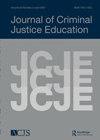What Happens after Tenure? Exploring Stimuli of Promotion to Full Professor in Top-Ranking Criminology and Criminal Justice Programs in the United States
IF 0.9
Q3 CRIMINOLOGY & PENOLOGY
引用次数: 0
Abstract
AbstractThis research addressed how research productivity and scholarly influence may contribute to associate professors’ promotion to the full professor rank. In 2017, we collected vitae of tenure-track faculty employed at top Ph.D.-granting criminology and criminal justice programs in the U.S.A. In this paper, we used the data for 213 associate and full professors and employed survival analysis to examine their time to promotion and factors that stimulated the process. Results showed that the number of sole-authored articles and citation counts positively predicted faculty’s likelihood of being promoted to full professors. We also found faculty members who graduated after 1996 were promoted approximately twice as fast as those who graduated before the year; however, neither race nor gender influenced faculty promotion trajectories. Finally, limitations and implications were discussed.Keywords: Academic careerprofessorshiphigher educationcriminal justice educationtenure and promotion Disclosure statementNo potential conflict of interest was reported by the author(s).Notes1 The choice of prestigious journals is based on Sorensen et al.’s (Citation2006) list. The list includes Criminology; Justice Quarterly; Crime & Delinquency; Journal of Research in Crime and Delinquency; Journal of Criminal Law and Criminology; Criminology & Public Policy; Law & Society Review; Journal of Quantitative Criminology; Theoretical Criminology; Advances in Criminological Thought; Journal of Criminal Justice; Deviant Behavior; and Law & Human Behavior.2 Though the journal impact factor is a commonly used proxy of scholarly influence (Adler et al., Citation2009; Gardner & Veliz, Citation2014; McKiernan et al., Citation2019; Niles et al., Citation2020), it is beyond the scope of the current study to include the measure.3 A small portion of the sample (n = 32) graduated on or before 1977, and as early as 1966. These faculty members have been in service for 40–50 years and are past the standard retirement age of 65. They also differ considerably in time of promotion and publication records. We decide not to include a third cohort and remove these cases from analyses.4 To avoid confusion, we do not use the common statistical/scientific language where Full Professors would have been labeled “failures.”Additional informationNotes on contributorsYang Vincent LiuYang Vincent Liu, M.S., is a Ph.D. Candidate in the School of Criminal Justice at Michigan State University. His research broadly examines migration, sexuality, and public opinions of crime and justice. His work on gender violence and sexual offending in Chinese societies has been featured in the Journal of Sex Research and Asian Journal of Criminology.Sanja Kutnjak IvkovichSanja Kutnjak Ivkovich, Ph.D., S.J.D., is a Professor in the School of Criminal Justice at Michigan State University. She serves as the Co-Editor-in-Chief of Policing: An International Journal. Her research focuses on policing and comparative/international criminology and criminal justice. She received the 2017 Mueller Award for Distinguished Contributions to International Criminal Justice from the Academy of Criminal Justice Sciences’ International Section.Jon MaskályJon Maskály, Ph.D., is an Assistant Professor in the Department of Criminal Justice at the University of North Dakota. His research interests revolve broadly around policing and quantitative methods of inquiry.Yongjae NamYongjae Nam, Ph.D., is an Assistant Professor in the Department of Criminology and Criminal Justice at the University of Texas at San Antonio. His research focuses on procedural justice, organizational justice, police training, police legitimacy, and interpersonal violence. His recent work has appeared in Journal of Research in Crime and Delinquency, Policing: An International Journal, International Journal of Offender Therapy and Comparative Criminology, Victims and Offenders, Journal of Criminal Justice Education, Criminal Justice Review, Police Practice and Research, and Journal of Family Violence.Richard R. BennettRichard R. Bennett, Ph.D., is a Professor in the Department of Justice, Law and Criminology at American University. He has conducted research and published one book and over 65 articles in the areas of police attitudes and behaviors as well as comparative crime and criminal justice. Earlier he has served as a police officer, a police trainer, a criminal investigator, and is currently a criminal justice consultant to national and international governmental commissions, universities, and contract research organizations. He has been both a Senior Fulbright Scholar and President of the Academy of Criminal Justice Sciences. He has won several national awards for his research and work in the field.Skyler MorganSkyler Morgan, Ph.D., is an Assistant Professor in the School of Criminology, Criminal Justice, and Emergency Management at California State University, Long Beach. His research interests include developmental and life-course criminology, corrections, and gender/sexuality in the criminal justice system. His previous work has been featured in Crime & Delinquency, Homicide Studies, and Journal of Crime and Justice.Katherine DunnKatherine Dunn, Ph.D., is a graduate of the Department of Justice, Law and Criminology at American University. Her research investigates the interface of psychology and the criminal justice system, with specific interests in legal decision-making, plea-bargaining, sentencing outcomes, and wrongful convictions.终身教职之后会发生什么?探索晋升为美国顶级犯罪学和刑事司法项目正教授的刺激因素
摘要本研究探讨了研究生产力和学术影响力对副教授晋升为正教授的影响。2017年,我们收集了美国顶尖犯罪学和刑事司法专业终身教授的简历。本文使用213名副教授和正教授的数据,并采用生存分析来研究他们的晋升时间和刺激晋升过程的因素。结果显示,独立撰写论文的数量和被引用次数正预测了教师晋升为正教授的可能性。我们还发现,1996年之后毕业的教师的晋升速度大约是1996年之前毕业的教师的两倍;然而,种族和性别都不会影响教师的晋升轨迹。最后,讨论了局限性和启示。关键词:学术生涯教授高等教育刑事司法教育终身任职与晋升披露声明作者未发现潜在利益冲突。注1知名期刊的选择基于Sorensen等人(Citation2006)的列表。其中包括犯罪学;正义的季度;犯罪与过失;犯罪与犯罪研究杂志;刑法与犯罪学杂志;犯罪学与公共政策;法律与社会评论;数量犯罪学杂志;犯罪学理论;犯罪学思想的新进展刑事司法杂志;越轨行为;2虽然期刊影响因子是学术影响力的常用代理(Adler等人,Citation2009;Gardner & Veliz, Citation2014;McKiernan et al., Citation2019;Niles et al., Citation2020),包含该措施超出了当前研究的范围一小部分样本(n = 32)在1977年或之前毕业,早在1966年就毕业了。这些教师已经工作了40-50年,超过了65岁的标准退休年龄。它们在推广时间和出版记录上也有很大差异。我们决定不纳入第三组,并将这些病例从分析中删除为了避免混淆,我们没有使用常见的统计/科学语言,因为全职教授会被贴上“失败”的标签。作者简介:刘洋Vincent Liu,硕士,密歇根州立大学刑事司法学院在读博士。他的研究广泛地考察了移民、性以及公众对犯罪和司法的看法。他关于中国社会性别暴力和性侵犯的研究曾在《性研究杂志》和《亚洲犯罪学杂志》上发表。Sanja Kutnjak Ivkovich, s.j.d.,密歇根州立大学刑事司法学院教授。她是《警务:国际期刊》的联合主编。她的研究重点是警务、比较/国际犯罪学和刑事司法。她获得了2017年刑事司法科学院国际分会颁发的穆勒国际刑事司法杰出贡献奖。Jon MaskályJon Maskály博士,北达科他大学刑事司法系助理教授。他的研究兴趣广泛围绕警务和定量调查方法。Yongjae Nam博士是德克萨斯大学圣安东尼奥分校犯罪学和刑事司法系的助理教授。他的研究主要集中在程序正义、组织正义、警察培训、警察合法性和人际暴力。他最近的工作已经出现在犯罪和犯罪研究杂志,警务:国际期刊,罪犯治疗和比较犯罪学的国际期刊,受害者和罪犯,刑事司法教育杂志,刑事司法审查,警察实践和研究,和家庭暴力杂志。Richard R. Bennett博士,美国大学司法、法律和犯罪学系教授。他在警察态度和行为以及比较犯罪和刑事司法领域进行了研究并出版了一本书和65多篇文章。此前,他曾担任警官、警察培训师、刑事调查员,目前是国家和国际政府委员会、大学和合同研究组织的刑事司法顾问。他曾担任高级富布赖特学者和刑事司法科学院院长。他在该领域的研究和工作曾多次获得国家奖项。斯凯勒·摩根博士是长滩加州州立大学犯罪学、刑事司法和应急管理学院的助理教授。
本文章由计算机程序翻译,如有差异,请以英文原文为准。
求助全文
约1分钟内获得全文
求助全文
来源期刊

JOURNAL OF CRIMINAL JUSTICE EDUCATION
CRIMINOLOGY & PENOLOGY-
CiteScore
1.90
自引率
36.40%
发文量
52
期刊介绍:
The Journal of Criminal Justice Education (JCJE) is an official publication of the Academy of Criminal Justice Sciences (ACJS). JCJE provides a forum for the examination, discussion and debate of a broad range of issues concerning post-secondary education in criminal justice, criminology and related areas. The aim of JCJE is to enhance the quality of higher education in criminal justice and criminology. JCJE is an education-oriented journal for those undertaking educational and academic endeavors in the fields of criminal justice and criminology. Quality articles that address specific educational or academic issues in these areas are encouraged and will be considered for publication.
 求助内容:
求助内容: 应助结果提醒方式:
应助结果提醒方式:


